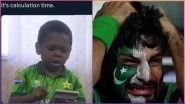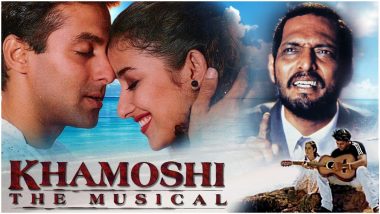Sanjay Leela Bhansali is a name associated with grandiose, of historical dramas, of blockbuster tags, and of courting controversy of manipulating history (or historical fiction, in case of Padmaavat). As the filmmaker completes 25 years in the industry, it is difficult to imagine his humble beginning, making a movie that wasn't set among eye-striking sets, but ripened merely in story-telling and in its performances. Also, yeah, Khamoshi: The Musical being a flop at the box office. Deepika Padukone, Alia Bhatt, Ranveer Singh, Salman Khan Congratulate Sanjay Leela Bhansali For Completing 25 Years In The Industry.
Khamoshi: The Musical came out August 9, 1996. Bhansali had written the screenplay of the film, along with Sutapa Sikdar (the late Irrfan Khan was her husband). The movie had starred Nana Patekar, Manisha Koirala, Salman Khan, Seema Biswas and Helen. Despite the critical acclaim, the film underperformed at the box office.
The later success of Hum Dil De Chuke Sanam often led many to perceive that Bhansali's sophomore film was his debut, but Khamoshi was quite content being away from the limelight. Waiting for the admirers to seek it and regret not giving it attention when it first came out, the film has remained a curio in the director's filmography. For someone who has been visually dazzled by his films over the years, but less impressed by the content he has to offer, Khamoshi: Musical remains a perennial favourite of this writer when it comes to Bhansali movies. #25YearsOfSLB: Check Out This Beautiful Montage of Sanjay Leela Bhansali’s Magic As the Filmmaker Completes 25 Years in the Industry.
Let me list you five reasons why. Also check out Khamoshi: The Musical on Amazon Prime Video, if you haven't already.
Bhansali's No-Frills Emotions-Laden Storytelling
Khamoshi: The Musical is first, and foremost, an emotional tale of a father-daughter relationship that goes through its ups and down. Some of the elements may be seen as toxic in today's too-political era, but these are flawed, and therefore real people, who do not talk in prose like how Bhansali's later characters turn out to be. Be it the Goan Christian culture, the character bonding moments and the bg drama moments, Bhansali still manages to keep it contained and effective.
The sensitive handling of Nana and Biswas' characters, who are auditory-impaired, and their apprehensions about losing their 'normal' daughter (made even stronger after losing their son) are relatable, even if the father's view of the daughter's relationship with her Hindu boyfriend (reverse love jihad?) comes across as narrow-minded. The plotline may feel dated in these times, but the way it is told and performed makes it so much better.
If you want a sample of how Bhansali beautifully handles the relationship moments of the film, look no beyond the below song, where Manisha's character signs off to her parents what she is singing to keep them in the loop!
Nana Patekar and Manisha Koirala
Another huge advantage that Khamoshi had was in its casting. Nana Patekar (who is recently out of the acting spotlight over #MeToo scandal) showed in that famous church sequence that he didn't need words to deliver what could be a monologue rivalling that of his in Krantiveer. When it comes to the actor's performances, I rank Joseph highly on the top, along with his acts in Parinda and Salaam Bombay.
Then there is Manisha Koirala, delivering her career-best performance as Annie, the 'hero' of the film. As the girl torn between letting down her parents and not wanting to let go of her forbidden love, the actress does a fantastic job of portraying the complex upheavals of her characters, also earning her a Filmfare Critics Award for Best Actress and a Star Screen Award for Best Actress.
Finally let's not forget Seema Biswas, whose character may become secondary in the father-daughter story, but leaves an indelible impression as the loving mother caught in their friction.
Salman Khan, Not The Star
We often talk about Salman Khan the star, but not much about Salman Khan the actor these days. Not exactly our fault, as the superstar rarely gives us an opportunity of a film that isn't obsessed with his massive star-power or his abs (both real and CGI) and his errr... unique dance moves.
But Salman Khan is also someone who surprises us by sometimes allowing the director's vision to take over his star power. Be it in Khamoshi or Phir Milenge, he has been quite happy taking a more secondary but essential part and thereby giving a couple of his most heart-rending performances to date. While Nana was fantastic in the church sequence, do watch Salman's Raj fumbling with his speech, overladen by emotions, in trying to translate his father-in-law's sign-language and how he sells that moment so effectively. Something he failed to do when HDDCS did a similar scene with him in the climax.
The Musical
Considering save for Black, all the movies of Bhansali have been musicals, this epithet before the name may sound strange. But it may have to do with making his film stand apart from the other Khamoshi that came before - the 1970 Asit Sen film which also had some great songs ("Woh Shaam Kuch Ajeeb Thi", for example).
Living up to its title, anyway, Khamoshi: The Musical has some lovely music from composer duo Jatin-Lalit before they split up. Songs like "Aaj Main Upar", "Bahon Ke Darmiyan", "Aankhon Mein Kya" and "Jaana Suno Hum Tum Pe Marte Hain" enchanted the listeners then and continue to do so now. Yes, it is heartbreaking to learn that the last song was a beat-by-beat copy of Paul Anka's "Bring The Wine". But considering that we are still revering the late RD Burman, despite many of his songs being 'inspired', can we overlook this aberration?
An Underrated Curio
Bhansali's later films have been about visually powerful storytelling, from Devdas' final moments to Bajirao and Mastani dying at the same moment in Bajirao Mastani to Padmavati walking towards her jauhar with other queens and women of the palace in Padmaavat. His Khamoshi was more about his characters handling the powerful parts, and thus being his most contained, restrained film to date. It is also perhaps his only film that dealt with middle-class characters, and this remains a curio in his filmography, an underdog. And we all love underdogs, don't we?
(The above story first appeared on LatestLY on Aug 09, 2021 08:34 PM IST. For more news and updates on politics, world, sports, entertainment and lifestyle, log on to our website latestly.com).













 Quickly
Quickly


